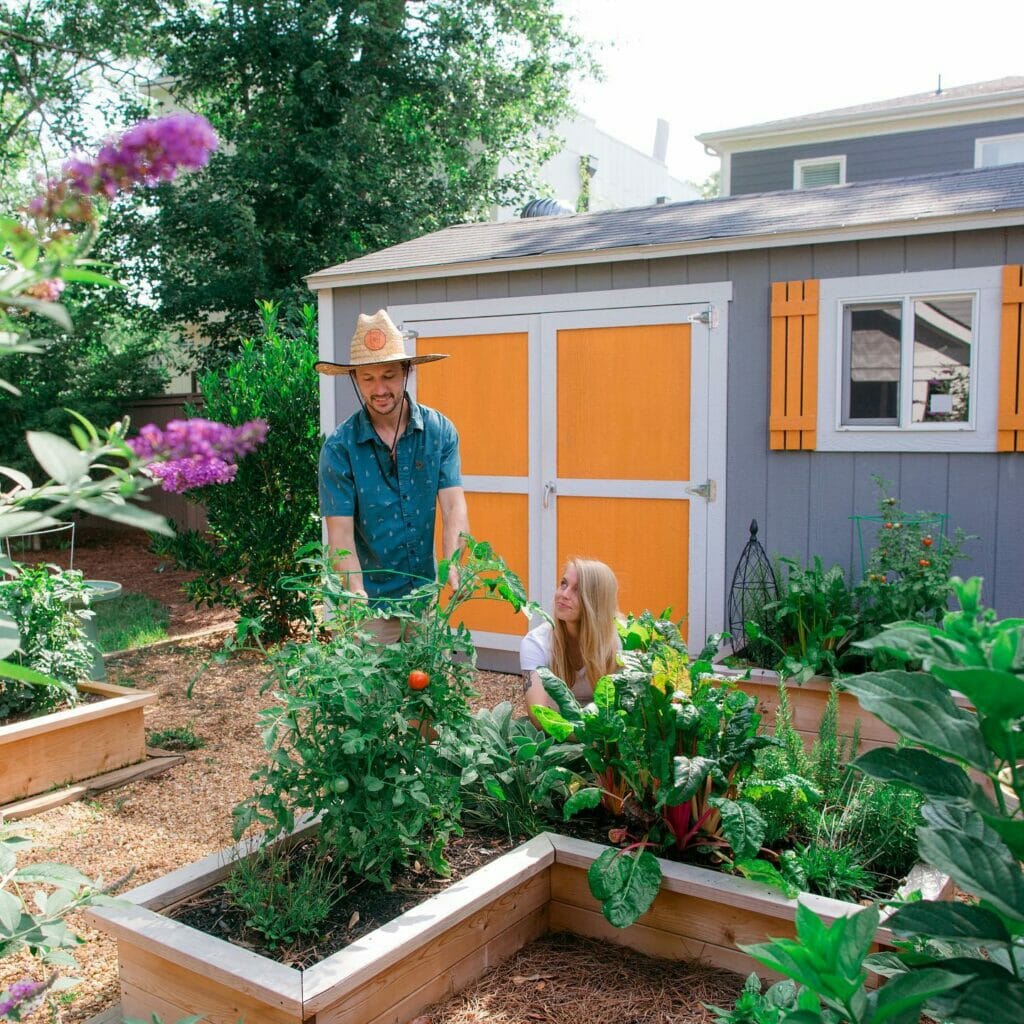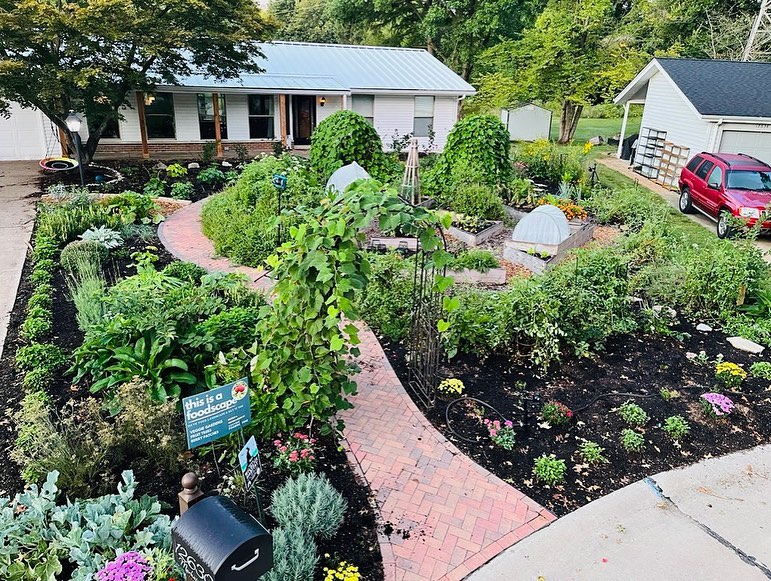Turn Your Backyard Into a Snack Yard With Edible Landscapes
Daniel Mobley was a single of the quite a few men and women laid off from their career at the beginning of the pandemic. No extended a recreation director, Mobley was in want of a hobby to aid fill his newfound cost-free time. He located inspiration in his yard back garden.
The Atlanta resident embraced the obstacle of turning his suburban lawn into a mini-farm, reimagining the house and setting up fruit trees and bushes. Together with his spouse, Sarah, Mobley posted on social media about his dwelling yard, which promptly grew to contain pomegranates, persimmons, satsumas, peaches and blueberries. Mobley loved to walk all over his property, grazing on fruit he grew himself, and started out referring to the area as a “snack yard.”
“It implies that you really don’t will need to be a homesteader to go out to your land and snack and graze,” states Mobley.
As the property grew larger, so did the couple’s social media following. Quickly, they had been fielding requests to support others change their personal out of doors areas. Which is when they released Thyme to Bash, where by Mobley now will work with consumers on edible landscaping initiatives of all measurements. Normally, that signifies mimicking the seem of a “traditional” landscaped garden but with essential substitutions.
“We’ll use evergreen pineapple guava rather of boxwoods or we’ll toss in a serviceberry tree that has genuinely stunning spring flowers,” suggests Mobley. “We just test to improve the paradigm that if you want to back garden or mature foodstuff it has to seem like your grandma’s garden with straight rows.”

Mobley is fortunate to be operating with a almost yr-spherical growing time. Atlanta’s warmer climate signifies that his gardens can develop nearly just about anything and at most moments of the year. His local customers harvest lettuce as a result of January.
Edible landscapers in colder climates aren’t as blessed. Andy Webster, owner of MEG’s Edible Landscapes in Northfield, Minnesota, has to get the job done otherwise. “We have less than 120 times frost-free,” he states. “So, all the things has to be imagined out beforehand, and every thing has to be commenced indoors.” Webster is thorough with fruits and greens that really don’t tolerate frost, and he has to do a good deal of watchful preparing to be certain vegetation get a healthier start out ahead of they go wherever in close proximity to a client’s lawn.
Webster is aware of how overwhelming mastering to garden can be and would like his consumers to have the ideal probability of achievements. That is why he will work exclusively with increase luggage, which are made from material and are lighter, additional breathable and less complicated to transportation than common pots. “At this stage, I have set just about anything at all that I can get my arms on into a bag to see how it performs,” he states. “One thing that doesn’t do the job is sweet corn. I tried out it and the economics really don’t genuinely perform out mainly because I’d have to have a 10- to 15-gallon bag for just one stalk of corn. It just does not make any feeling.” Apart from corn, Webster suggests nearly all plants adapt properly to them.
The increase bags also perform very well for his purchasers, quite a few of whom are renters or really don’t have their properties. “I have customers who dwell in townhouses, condos, residences or even single-household houses, but they do not have inexperienced area or they have lousy soil. So, this procedure operates beautifully for them,” states Webster. The bags are lightweight, which is great for people hunting for portability, specially with Minnesota’s temperature.

Custom Foodscaping created this edible garden. Photograph courtesy of Personalized Foodscaping.
Like Mobley, Webster can help his consumers decide out plants and types that operate very best for their space. In the long run, even though, he hopes to show men and women just how quick increasing your individual meals can be. “One of my favored items is when any person has a anxiety [of gardening failure] and now they have that joy simply because they skilled the results,” he claims.
That is what Matt Lebon aims to do as perfectly. “We want gardens to have mass charm, we want gardens to look captivating and integrated,” claims Lebon, founder and proprietor of The Foodscaper and Custom made Foodscaping in St. Louis, Missouri. “We require a back garden to come to feel like an quick decision for a customer.”
With that in brain, Lebon and his team make gardens that involve all the things from fruits and veggies to herbs, trees and rainwater catchment spots. Normally implementing raised beds to make the backyard more physically obtainable to shoppers, Lebon will work to provide in as lots of diverse species of plants as doable. “When we plant any variety, we can start out to improve interaction,” he claims, noting that there is some education he does with his consumers about why an enhance in bees, butterflies and other animals in their place is a great issue.
As more landscapers pivot to the edible facet of the small business, skilled gardeners like Lebon hope to shift the terminology as effectively. There is a cause he chose the phrase foodscaping. “It indicates a livelihood, a professionalism and schooling and know-how all over foods,” he claims. Landscaping, as it’s usually recognized, may well be witnessed as “a degenerative exercise, wherever we aim on decorative vegetation and grass. And neither of those things are obtaining a beneficial impact on our ecologies,” Lebon states. “We will need this new language, since [foodscaping] is incredibly distinctive.”
Though foodscaping and edible landscaping may be well-liked at personal residences and personal residences, there are however prospects to raise the observe. In Ga, Mobley has labored with county commissioners to adapt rules and integrate edible landscaping in general public regions. Thyme to Bash also labored with local Atlanta libraries in 2021 to generate “pocket parks,” filling them with blackberries, blueberries, mulch pathways and trellises. Other companies, together with Atlanta’s Concrete Jungle, have mapped parts in the town the place fruit trees and bushes mature on community land, tracking what’s in season and what demands to be picked. Their volunteers harvest the meals and distribute it to neighborhood systems.
There are lots of techniques that edible and ecological landscaping can be incorporated into our metropolitan areas, and Mobley states the shift in contemplating is occurring now. Relatively than having a pristine landscape or one that necessitates a team of people today to manage, Mobley says men and women are fired up by the notion of a living and respiration landscape—one that offers again as substantially as it receives.
